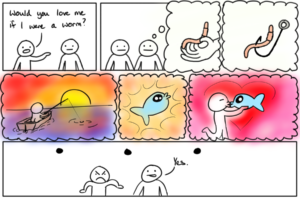Over 500 people of different cultures, ages, countries and faith backgrounds congregated at Nazareth College for the first annual international Interfaith Understanding Conference, or IUC. Throughout the course of the three day conference from April 11-13 students from Rochester to Afghanistan gathered to discuss issues that are plagued by cultural misunderstanding and religious misconceptions.
During his opening statement, Nazareth College’s President Daan Braveman recognized the conference as being integral to positively sharing religion.
‘[We want] a world where religious differences is not seen as the cause of wars, rather that religious difference is seen as a great strength,” Braveman said. ‘That is the goal of this conference.”
The highlights of IUC were six keynote addresses by world-renowned religious leaders including Eboo Patel, founder of the Interfaith Youth Core and current member of President Obama’s Advisory Council of the White House Office of Faith Based and Neighborhood Partnerships.
Interfaith topics were divided into a series of workshops that aimed to engage eight critical cross-cultural issues. One of the workshops, which addressed female contributions to the World’s Parliament of Religions, was led by UR Director of Religious and Spiritual Life and founder of the Women’s Interfaith Institute the Rev. Allison Stokes.
IYC intern, Students’ for Interfaith Action President and UR senior Tamara Slater was highly involved in publicizing and overseeing the logistics and administrative success of the conference.
The conference attracted people from different faiths, as well as secular humanists, who make up 20 percent of the supporters of the movement. One student in attendance, a sociology major from the University of the Philippines Marlon Para, endured a three-day flight with layovers in Tokyo and New York City to attend IUC.
‘It’s great to be here,” Para said. ‘I have had the opportunity to meet people of different faiths and backgrounds. I’ve learned so many interesting things from so many different backgrounds.”
Patel’s keynote address on Tuesday night urged attendees to positively engage religious diversity by seeking pluralism as opposed to conflict. Patel hailed Martin Luther King, Jr. and Mahatma Gandhi as perfect examples of the kind of leadership that is needed to create an ideal environment for peaceful religious dialogue. He noted that they had visions for a pluralistic and united humanity, and the skill sets to bring religions together.
An essential part of his speech was aimed at making a distinction between extremism and religion. Patel argued that people shouldn’t associate any terrorist with a particular religion. Instead, he said that they should be categorized under one umbrella: extremism. He added that the young extremists that are portrayed by the media are products of a larger issue.
‘Eighteen-year-olds don’t drop from the sky ready to grab a gun and kill others,” he said. ‘They are trained. If we don’t build bridges, then we leave it to the people that want to build barriers and bombs [to cause conflicts].”
Although Patel is considered to be the current face of the Interfaith Movement, it has its roots in 1893’s Parliament of World Religions in Chicago. Over the years, members of the movement have sought a religious understanding and cooperation towards common goals.
A key component of today’s movement is to encourage young adults to create a new standard for supporting and cooperating with different faith traditions.
The conference was held to inspire individuals of all generations to get involved and strive for a better future.
‘It is a conference that really seeks to combine the wisdom of one generation with the vitality of the next,” Braveman said.
Supporters of the movement emphasize that plurality is an imperative condition in order to facilitate an untied humanity.
‘What a world would we live in if people had at the tip of their tongue compassion for other religions?” Patel said. ‘We need to take religious diversity and seek pluralism, positive engagement of different religions and faith backgrounds. We should seek to live in equal dignity and mutual loyalty.”
After Rabbi Hirchfield closed the conference with a self-reflective keynote address, with a topic on religious fanatics, students, locals and religious leaders ate lunch together.
Slater was pleased with the event, and hoped that students left from the conference with a new outlook.
‘I hope that college students who came to the conference will have left with a sense of the energy around interfaith across generations. The multitude of approaches and a sense of how important interfaith work is,” she said.
Nathaniel a member of the class of 2011.
